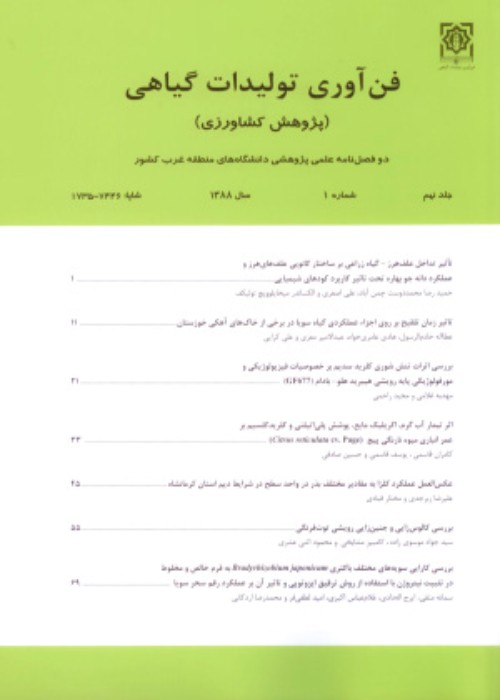Antioxidant, Lipase Inhibitory Activity, and Antimicrobial Properties of Capparis Decidua and Withania Somnifera Extracts
Author(s):
Article Type:
Research/Original Article (دارای رتبه معتبر)
Abstract:
Introduction
Natural and chemical additives and preservatives with antimicrobial and antioxidant properties have been used in food products for many years to prevent food contamination and increase shelf life and maintain food quality after production. With the increase in people's awareness of chemical preservatives, the tendency to use natural food preservatives, especially plant extracts and essential oils, has grown significantly. The phenolic compounds and small terpenoids present in the extracts of medicinal plants have antibacterial, antifungal, anticancer and antiviral agents, and this property of inhibiting and killing pathogenic microorganisms in the extracts of medicinal plants has made them a suitable alternative to preservatives and chemical drugs. These compounds can be extracted from medicinal plants native to Iran.Aim
Considering the importance of using natural additives, the present research aims to investigate the antioxidant property, lipase enzyme inhibitory ability, and antimicrobial property of Capparis decidua and Withania somnifera extracts as native plants of Iran in different concentrations in laboratory and food conditions.Materials and methods
For this purpose, Withania somnifera plant from the Solanaceae family which belongs to the southern regions such as Fars, Khark Island, Sistan and Baluchistan, Kerman, Hormozgan (Bushehr) and the cities of Sarbaz, Saravan, Zabul and around the city of Zahedan is geographically specific in Iran. and the Capparis decidua plant which belongs to the Capparidaceae family and is part of the desert plants and is resistant to long-term drought and belongs to the southern regions of Iran from the east of Hormozgan province in Sirik region to Sistan and Baluchistan province (Saravan, Chabahar, Nikshahr, Iranshahr) southeast of Iran, were collected and after washing and drying, the plants were ground and powdered, and for extracting, the powdered plants were first poured into a beaker and solvent was added, and then extracted by ultrasonic method. After extracting the total phenolic compounds of Withania somnifera and Capparis decidua plant extracts by Folinciocalto method using a spectrophotometer with a wavelength of 765 nm, and also the antioxidant activity of the plant extracts was checked through the ABTS free radical scavenging test using an ELISA reader with a wavelength of 734 nm. In the next step, the effect of different concentrations of aromatic compounds in plant extracts and the inhibitory properties of lipase enzyme were investigated by ELISA device with a wavelength of 405 nm. Also, the antimicrobial properties of the extracts were evaluated on Candida albicans, Pseudomonas aeruginosa, and Streptococcus mutans strains by the non-growth halo method. The effect of Withania somnifera and Capparis decidua extracts on Helicobacter pylori was also investigated.Findings
The test results of total phenolic content and percentage of free radical inhibition of the extracts showed a positive and significant relationship between the amount of phenolic compounds and the antioxidant properties and concentration of the extract (P<0.05). The highest amount of phenolic compounds and antioxidant properties are found in the extract of Withania somnifera plant. In the analysis of the extracts, it was found that the clear extract had the most effect (94.32%) in inhibiting the lipase enzyme. Examining the average diameter of non-growth halo of the extracts against Pseudomonas aeruginosa bacteria, Streptococcus mutans and Candida albicans yeast showed that Withania somnifera extract had the largest diameter against Pseudomonas aeruginosa bacteria. Capparis decidua extract has the most antimicrobial properties against Candida albicans yeast and also Capparis decidua extract has shown the highest non-growth halo against Streptococcus mutans bacteria. In the study of the effects of extracts on Helicobacter pylori, it was found that the highest Helicobacter inhibitory rate was related to Capparis decidua extract (94.32%). By examining the results obtained from the antioxidant and antimicrobial properties of these plants, the extracts of these plants can be used as natural additives.Conclusion
The use of additives and preservatives in food products is justified when it is not harmful to the consumer. Some preservatives are chemically harmful to humans and are classified as carcinogens. With the increase in people's awareness of chemical preservatives, the tendency to use natural food preservatives, especially plant extracts and essential oils, has grown significantly. Due to the antioxidant and antimicrobial properties of the extracts of the Capparis decidua and Withania somnifera plants, the extracts of these plants can be used as natural preservatives and antioxidants in the food industry.Keywords:
Language:
Persian
Published:
نشریه فنآوری تولیدات گیاهی, Volume:22 Issue: 2, 2023
Pages:
107 to 122
magiran.com/p2650976
دانلود و مطالعه متن این مقاله با یکی از روشهای زیر امکان پذیر است:
اشتراک شخصی
با عضویت و پرداخت آنلاین حق اشتراک یکساله به مبلغ 1,390,000ريال میتوانید 70 عنوان مطلب دانلود کنید!
اشتراک سازمانی
به کتابخانه دانشگاه یا محل کار خود پیشنهاد کنید تا اشتراک سازمانی این پایگاه را برای دسترسی نامحدود همه کاربران به متن مطالب تهیه نمایند!
توجه!
- حق عضویت دریافتی صرف حمایت از نشریات عضو و نگهداری، تکمیل و توسعه مگیران میشود.
- پرداخت حق اشتراک و دانلود مقالات اجازه بازنشر آن در سایر رسانههای چاپی و دیجیتال را به کاربر نمیدهد.
In order to view content subscription is required
Personal subscription
Subscribe magiran.com for 70 € euros via PayPal and download 70 articles during a year.
Organization subscription
Please contact us to subscribe your university or library for unlimited access!



